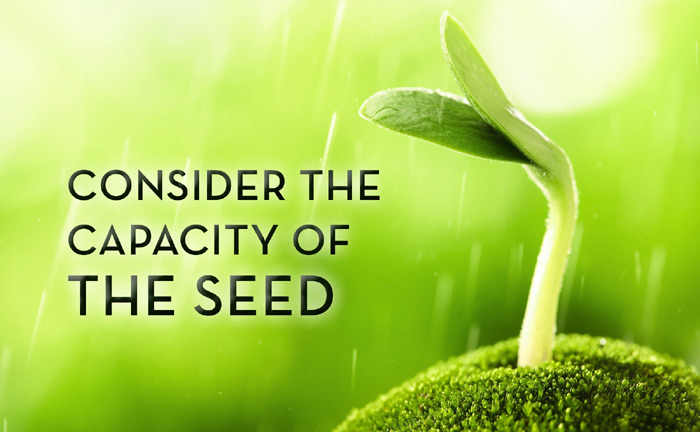
It shouldn't surprise us that Jesus, the One through whom all things were created, would have unparalleled wisdom and knowledge pertaining to "all things," even in respect to biology (the study of organisms and plants). Matthew 13:1-9, often referred to as "The Parable of the Sower," is one of the more lighthearted and informative encounters that we, the readers of Scripture, get to vicariously experience as we read the apostle's account. But to tell the stories and teach the lessons He intended, Jesus needed to draw upon His unlimited knowledge of plants:
"On the same day Jesus went out of the house and sat by the sea. And great multitudes were gathered together to Him, so that He got into a boat and sat; and the whole multitude stood on the shore. Then He spoke many things to them in parables, saying: 'Behold, a sower went out to sow. And as he sowed, some seed fell by the wayside; and the birds came and devoured them. Some fell on stony places, where they did not have much earth; and they immediately sprang up because they had no depth of earth. But when the sun was up they were scorched, and because they had no root they withered away. And some fell among thorns, and the thorns sprang up and choked them. But others fell on good ground and yielded a crop: some a hundredfold, some sixty, some thirty. He who has ears to hear, let him hear!'".
I love that Jesus is, at once, so connected to everything and everyone around Him - no matter how seemingly insignificant their focus - while, at the same time, so enmeshed with His Heavenly Father. I can picture Him casually walking out of the house then, after arriving near the shore, taking hold of the tiny limb of a plant as He climbs on board His floating pulpit. His lessons were purposely intended to teach the principles and mysteries of the Kingdom of Heaven; in this case, using the plant and its vitality as a metaphor to demonstrate the relationship between a plant (the seed) and the soil and/or rocky elements that can either enable or impede its flourishing.
Jesus refers to the importance of the quality and quantity of the soil in which the seeds will be imbedded and hopefully thrive -- comparing good soil to that "spiritual substrate" which comes about from the faithful and patient discipleship of those who will grow and be sustained in the Lord. Believers diligently discipled in the faith are then likened to healthy plants that have been deeply rooted in good soil and, therefore, able to produce much good fruit.
In the temporal world of biology, there are lessons to be drawn from our Lord's creation. For one thing, "timing is everything," and by that I mean we must be patient and respect the processes of God's natural order and the pacing of His Kingdom principles. Those whom are persecuted and wrongly imprisoned because of the proclamation of their faith in Christ surely understand the principle of accepting God's timing for the outcome of their affliction. Our patience and abiding trust in the Lord's sovereignty must also be at play in relation to those whom we present the Gospel, just as it is in the planting and nurturing of seeds that are to become a harvest.
Emphasis is placed on the mass and quality of the roots, which provide nourishment and a foundation for the whole plant. There is, however, a pre-determined capacity for growth within the seed that is latent and seemingly indominable. It is this mysterious energy in all of creation, and especially in humankind, that is evident and accessible to all who allow God's Holy Spirit to instruct them diligently and patiently, thus rooting themselves in deep and nutrient-rich soil in preparation for work in His fields.
Pray with us, therefore, that the Lord will prepare our hearts to receive and nurture the seed, such that we, together with God's Spirit, will witness the growth of spiritual fruit.
May the Lord fully bless you and yours throughout 2017 and beyond,
![]()
Doug J. McKenzie
Chief Executive Officer
The Voice of the Martyrs Canada


